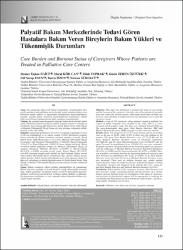| dc.contributor.author | Eğici, Memet | |
| dc.contributor.author | Can, Meral | |
| dc.contributor.author | Toprak, Dilek | |
| dc.contributor.author | Öztürk, Güzin | |
| dc.contributor.author | Esen, Elif Serap | |
| dc.contributor.author | Özen, Burcu | |
| dc.contributor.author | Sürekci, Nurcan | |
| dc.date.accessioned | 2022-05-11T14:37:07Z | |
| dc.date.available | 2022-05-11T14:37:07Z | |
| dc.date.issued | 2019 | |
| dc.identifier.issn | 2149-4983 | |
| dc.identifier.issn | 2149-9306 | |
| dc.identifier.uri | https://doi.org/10.5222/jaren.2019.38247 | |
| dc.identifier.uri | https://app.trdizin.gov.tr/makale/TXpJeE1UUTNOdz09 | |
| dc.identifier.uri | https://hdl.handle.net/20.500.11776/8583 | |
| dc.description.abstract | Amaç: Bu çalışmada, halen evde bakım hizmetinden yararlanmakta iken,çeşitli nedenlerle palyatif bakım merkezlerinde yatan hastalara bakım verenbireylerin bakım yükleri ve tükenmişlik durumlarının değerlendirilmesi;hastalar yanında bakım verenlerin gereksinimlerini karşılamaya yöneliktıbbi-sosyal hizmet planlamalarına katkı sunulması amaçlanmıştır.Yöntem: Bu çalışma kamu hastaneleri palyatif bakım merkezlerinde tedavigören 129 hastaya bakım verenlerde yapıldı. Çalışma kesitsel ve tanımlayıcıniteliktedir. Sosyodemografik bilgi formu, Zarith Bakım Verme Yükü Ölçeğive Maslach Tükenmişlik Ölçeği formu yüz yüze görüşme yöntemiyle doldurularak veriler elde edildi.Bulgular: Çalışmaya katılanların 92’si (%71,3) kadındı, çoğunluğu (%54,3)41-64 yaş grubundaydı ve en yüksek oranda (%42,6) hastaların çocuklarıbakım vermekteydi. Bakım verenlerin ortalama puanları sırasıyla, ZarithBakım Verme Yükü Ölçeği’nden 37,71±15,44; Maslach Tükenmişlik Ölçeğialt grupları olan Duygusal Tükenmişlikten 12,16±8,20, Duyarsızlaşmadan4,19±4,25 ve Kişisel Başarıdan 19,68±5,43 puan olduğu belirlendi. Bakımverenlerin bakım yüklerinin artması ile Maslach Tükenmişlik Ölçeği altgrupları Duygusal Tükenme (R=0,611; p=0,000) ve Duyarsızlaşma(R=0,476; p=0,000) arasında pozitif yönde, Kişisel Başarı (R=-0,232;p=0,008) arasında negatif yönde anlamlı bir ilişki bulundu. Bakım vereninyükü arttıkça tükenmişlik düzeyi artmaktaydı. Yaş, cinsiyet, medeni durum,eğitim durumu, bakım hizmeti karşılığında ücret alma durumu, başka birbakıcı ile çalışılması ve baktığı hastanın tanısı ile Zarith Bakım Verme YüküÖlçeği ve Maslach Tükenmişlik Ölçeği arasında anlamlı bir fark bulunmadı(p>0,05).Sonuç: Bakım verenlerin yükleri arttıkça tükenmişlikleri de artmaktadır.Bakım süresinin uzunluğu ve kronik hastalık varlığı tükenmişliği artırmaktadır. Sağlık çalışanları tarafından bakım verenlerin durumunun değerlendirilmesi, psikososyal olarak destek verilmesi, bakım yükünün ve tükenmişlik duygusunun azaltılması ve aynı zamanda bakım hizmetinin kalitesi açısından uygun olacaktır. | en_US |
| dc.description.abstract | Objective: This study was performed to evaluate the status of care burden and the burnout of the caregivers who take care of the patients in the palliative care centers for various reasons, while under observation of home care services; and contribute to medicosocial service planning so as to meet the caregivers needs. Method: A total of 129 caregivers whose patients treated in palliatif care centers of public hospitals were enrolled in the study. This is a crosssectional and descriptive study. The data were obtained through filling up The socio-demographic data sheet, Zarit Burden Interview (ZBI) and Maslach Burnout Inventory (MBI) using face-to-face interview method. Results: Of the 129 caregivers, 92 (71.3%) were women, and 54.3% of them were at the age of 40-64; while 42.6% of them were the children of the patients. The mean Zarit Burden Interview score (37.71±15.44) and the mean Maslach Burnout Inventory score of Emotional Exhaustion (12.16±8.20), and the mean Depersonalization score (4.19±4.25) and the mean Personal Accomplishment score (19.68±5.43) were also estimated.. We found a positive correlation between the increasing burden of caregivers with the subgroups of Maslach Burnout Inventory Emotional Exhaustion (R=0.611; p=0.000) and the Depersonalization (R=0.476; p=0.000). There was a negative correlation between the increasing burden of caregivers and their Personal Accomplishment (R=-0.232; p=0.008). As the Zarit Burden Interview score increased the level of Maslach Burnout Inventory scores also increased. There were no relation between age, gender, marital status,education status of caregivers,absence of financial support, working with another caregiver, the diagnosis of the patients they were caring for and Zarit Burden Interview and Maslach Burnout Inventory (p>0.05). Conclusion: When burden of the caregivers increase; their burnout level also increases. Longer caregiving periods and the presence of a chronic disease increase burnout levels too. Evaluation of the status of caregivers, and provision of phychosicial support will be appropriate in reducing the care burden and burnout perceived by healthcare professionals , and increasing quality of medical care services. | en_US |
| dc.language.iso | tur | en_US |
| dc.identifier.doi | 10.5222/jaren.2019.38247 | |
| dc.rights | info:eu-repo/semantics/openAccess | en_US |
| dc.subject | Yoğun Bakım | en_US |
| dc.subject | Tıp | en_US |
| dc.subject | Davranış Bilimleri | en_US |
| dc.subject | Hemşirelik | en_US |
| dc.subject | Psikoloji | en_US |
| dc.title | Palyatif Bakım Merkezlerinde Tedavi Gören Hastalara Bakım Veren Bireylerin Bakım Yükleri ve Tükenmişlik Durumları | en_US |
| dc.title.alternative | Care Burden and Burnout Status of Caregivers Whose Patients are Treated in Palliative Care Centers | en_US |
| dc.type | article | en_US |
| dc.relation.ispartof | Journal of Academic Research in Nursing | en_US |
| dc.department | Fakülteler, Tıp Fakültesi, Dahili Tıp Bilimleri Bölümü, Aile Hekimliği Ana Bilim Dalı | en_US |
| dc.identifier.volume | 5 | en_US |
| dc.identifier.issue | 2 | en_US |
| dc.identifier.startpage | 123 | en_US |
| dc.identifier.endpage | 131 | en_US |
| dc.institutionauthor | Toprak, Dilek | |
| dc.identifier.trdizinid | TXpJeE1UUTNOdz09 | en_US |



















